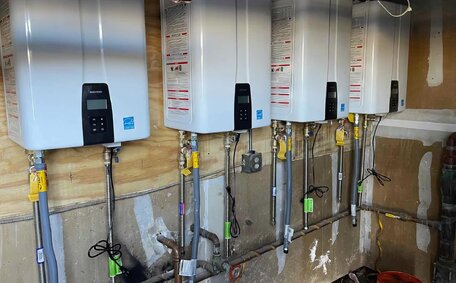What is natural gas and how is it used in homes?
Natural gas, similar to LP gas, is a methane-rich fossil fuel. It is a fuel source esteemed for its clean-burning properties, essential to your household for activities like:
- Cooking & heating - Natural gas is essential for cooking and heating, fueling our gas stoves and home heaters.
- Gas appliances - Natural gas powers various appliances, including clothes dryers, fireplaces, and outdoor grills.
Natural gas is supplied to homes via a network of pipelines, producing fewer emissions upon combustion compared to other fossil fuels.
Over half of Australian households choose natural gas due to its reputation for being a safe and efficient energy source.
Recognizing the safety features and benefits of natural gas
Despite its benefits, awareness of natural gas’s potential hazards is crucial for its safe use. An odorant called mercaptan is added, as per PSE Healthy Energy’s recommendation, to give natural gas a distinct 'rotten egg’ odour, which aids in the early detection of leaks. When used for electricity generation, natural gas emits about 50% less carbon dioxide than coal when burned, thus considered safer.
While no fossil fuel is emissions-free, burning natural gas contributes less to air pollution, emitting fewer air pollutants like particulate matter, nitrogen oxides, and sulphur dioxide than coal or oil. This contributes to improved indoor air quality in homes with natural gas appliances. Replacing old natural gas appliances with newer, more efficient models can reduce your environmental impact by lessening greenhouse gas emissions.
However, unburned methane from leaks and various toxins can degrade air quality and have negative health impacts, as evidenced by public health research. Proper installation, regular maintenance, and good ventilation, as recommended by health institutions, are vital for safe use in residential settings. Carbon monoxide detectors, to keep your environment safe, should be installed to alert occupants of any potential exposure to unburned natural gas.
Understanding the risks: Health hazards of natural gas leaks
Natural gas leaks pose serious health risks, especially in enclosed spaces. Among the risks, which can include:
Methane is naturally odourless; added mercaptan makes it detectable by smell. But odourant can fade over time or be masked by other smells. Natural gas, although typically lighter than air, can sometimes accumulate undetected indoors to dangerous levels, causing health issues such as:
- Headaches, dizziness, fatigue
- Nausea
- Breathing difficulties
- potential damage to vital organs such as the lungs, liver, and kidneys
Proper installation, maintenance, and ensuring you can turn off gas to appliances is vital to ensure your safety in your house. Consider installing carbon monoxide detectors as an extra precaution. If a gas leak is suspected, evacuate the area immediately and contact emergency services.
Carbon monoxide poisoning
With effective management, the risks posed by the toxic gas carbon monoxide (CO) can be significantly reduced. It is produced when natural gas or other fuels do not burn properly and completely. The incomplete combustion releases CO, which is invisible, odourless, and tasteless.
CO poisoning results from incomplete combustion and can cause flu-like symptoms, escalating to more severe health issues at higher levels of exposure. It can be life-threatening as CO binds to blood cells, reducing oxygen circulation in the body.
Carbon monoxide detectors, alerting you to dangerous levels of carbon monoxide, should be installed near all sources of your natural gas appliances, including water heaters, stoves and ovens. These devices warn occupants if CO levels become dangerously high, providing time for ventilation or evacuation – a vital safety precaution.
Yearly inspections of gas appliances and clear vents can prevent the production of CO due to incorrect burning. Fast action if natural gas poisoning, especially by unburned natural substances, is suspected can mean the difference between life and death.
Other health effects
Awareness of potential health effects from exposure to natural gas byproducts is critical.
- Headaches, dizziness, nausea
- Eye, nose and throat irritation
- Breathing difficulties
- Exacerbation of asthma
Such effects often arise from gases like carbon monoxide and nitrogen dioxide, released during incomplete combustion of natural gas. They are more likely in poorly ventilated indoor spaces.
Formaldehyde, linked to certain appliances like unvented stoves, can cause respiratory concerns and is a known carcinogen.
Pregnant women, children, the elderly and those with existing health conditions are most vulnerable to these effects. Following gas appliance maintenance recommendations and ensuring proper ventilation can reduce risk.
Keeping your household safe: Preventive measures for natural gas
There are several key preventive measures households should take for natural gas safety:
Inspections & Maintenance
- Have gas appliances inspected annually by a licensed gasfitter.
- For safety, regularly perform leak checks using a soap and water solution.
- Do gas safety checks to keep appliance vents and chimneys clear of debris and obstructions.
- Repair gas faults in lines and faulty appliances promptly to prevent safety hazards.
Ventilation
- Ensure all gas appliances have adequate airflow and ventilation.
- Do not use any item to block vents or exhausts even temporarily.
- Open windows to let in fresh air when using gas appliances where possible.
Safety Features
- Install carbon monoxide detectors according to manufacturer guidelines.
- Consider the installation of an emergency shutoff valve on your gas line for enhanced safety.
- Familiarise yourself with the location of your main shutoff valve and adhere to the 'dial before dig’ rule for quick gas shutoff in emergencies.
Adhering to gas appliance instructions, maintaining adequate ventilation, and seeking professional help for installations and repairs safeguard natural gas usage and minimise risks. Contact your gas provider immediately if you ever smell rotten eggs.
Maintaining your gas appliances
Routine maintenance, backed by experts such as the gas association, by licensed gas fitters is essential for the safe and efficient operation of natural gas appliances, ultimately securing your safety. Licensed gasfitters should inspect all gas appliances and pipework annually.
Homeowners need to carefully examine their gas systems for any signs of malfunction. If you smell gas, hear hissing from pipes or appliances, notice rust or water leaks, see pilot lights frequently extinguishing or appliances performing poorly, arrange inspection immediately.
Other tips include:
- Clean or replace air filters on heating systems regularly
- Keep appliance vents unblocked
- Check flexible gas lines for cracks or damage
- Test carbon monoxide detectors monthly
Regular maintenance significantly reduces risks of leaks, carbon monoxide poisoning, and other gas appliance issues. Neglecting maintenance can allow dangerous problems to develop over time. Staying on top of servicing and remaining alert to any changes in performance keeps your household safe.
Installing carbon monoxide detectors
As detailed in our video, carbon monoxide detectors are essential safety devices in any home using natural gas appliances or other fuel-burning systems. Though they do not detect natural gas itself, they sound an alarm if high, dangerous levels of odourless carbon monoxide gas are present.
Install carbon monoxide detectors centrally to monitor levels throughout the home, close to bedrooms and natural gas appliances. Refer to the manufacturer’s guidelines for ideal placement based on room sizes and layouts.
Hard wired carbon monoxide detectors provide the most reliable protection, with battery-powered models as an alternative. All detectors must conform to the Australian Standards and be replaced according to manufacturer specifications, typically every 5-7 years.
Test detectors monthly by pressing test buttons to ensure your batteries are functioning and alarm sounds are activated. Stay alert to any beeping and never ignore alarms. A high-pitched alarm indicates dangerously high carbon monoxide readings, signalling to evacuate and call emergency services immediately.
Emergency protocols: What to do during a natural gas leak
If you smell rotten eggs or suspect a leak in your gas system, immediate action is critical. Follow these emergency protocols:
- Evacuate the area. Do not use phones, turn on/off lights or any electrical devices that could produce sparks.
- If possible, shut off the main gas supply at the main shutoff valve outdoors.
- Call 000 once outside and report the leak; your quick action is crucial. Provide the exact location.
- Do not re-enter the building until emergency services give the all-clear. A licenced gasfitter must inspect and repair leaks before gas supply is restored.
After reporting the leak, contact your utility provider from outside. Remember, don’t attempt to locate leaks yourself due to the rapid accumulation of natural gas, which is lighter than air. Leave inspection and venting procedures to licenced professionals once evacuated.
If the rotten egg smell persists after the all-clear is given, evacuate immediately and alert your gas provider. It’s crucial never to disregard this odour.
Signs of a gas leak and what to do
Be alert for the following signs that may indicate a natural gas leak:
- A rotten egg smell. An odorant is added to natural gas to help detect gas leaks more easily.
- Hissing, whistling or roaring sounds coming from gas appliances or pipes
- Dead or dying vegetation in an otherwise moist area near gas lines
- Flames coming from the ground or burning above gas appliances
- Dirt blowing from a hole in the ground
- Bubbles in wet areas like puddles or creeks near gas lines
If you suspect a leak your immediate actions are critical:
- Evacuate the area immediately. Do not operate any switches or electrical devices.
- Open doors and windows to ventilate the area if it is safe to do so.
- Provide the exact location.
- Do not re-enter the building until emergency services declare it safe.
Ensure you are aware of the location of your outdoor main gas shutoff valve. Prompt knowledge of this can expedite the cessation of gas supply by authorised professionals or emergency responders when there’s a risk of fire or explosion.
Never try to locate the leak yourself or re-enter a building with a suspected gas leak. Leave inspection and venting to licenced gasfitters once evacuated.
Turning off the gas supply
Knowing where your gas safety tips and precautions are can help you manage gas supply to your home is a critical step in the event of a suspected gas leak or emergency. All household members should understand where the main gas shutoff valve is located outside, usually near the gas metre.
If you smell gas or suspect a leak, you can also evacuate immediately and call 000 once outside. Do not turn any electrical devices or lights on or off inside. Then, practising 'dial before’, locate the main shutoff valve outdoors:
- Use an adjustable wrench or appropriate shutoff tool to give the valve a quarter turn clockwise until it stops, effectively ensuring the gas is turned off. This action completely shut offs the gas flow into the house.
- To safely turn off your gas, make sure the valve is perpendicular to the pipe, thus ensuring it is truly off and the gas supply is fully halted.
Emergency services or your licenced gasfitter can then safely inspect, vent and locate any leaks. They will also relight pilot lights on appliances once any repairs are made, so please select your settings and it’s confirmed safe to restore gas flow. Never attempt to turn gas back on yourself.
Your gas metre may have its own shutoff valve, useful to stop any gas as well. Make sure your licenced professional identifies all shutoff points during appliance installations and checks.
Understanding basic shutoff allows quick action when gas leaks can cause emergencies to prevent fires or explosions. Regularly check that valves are functional and visible.






